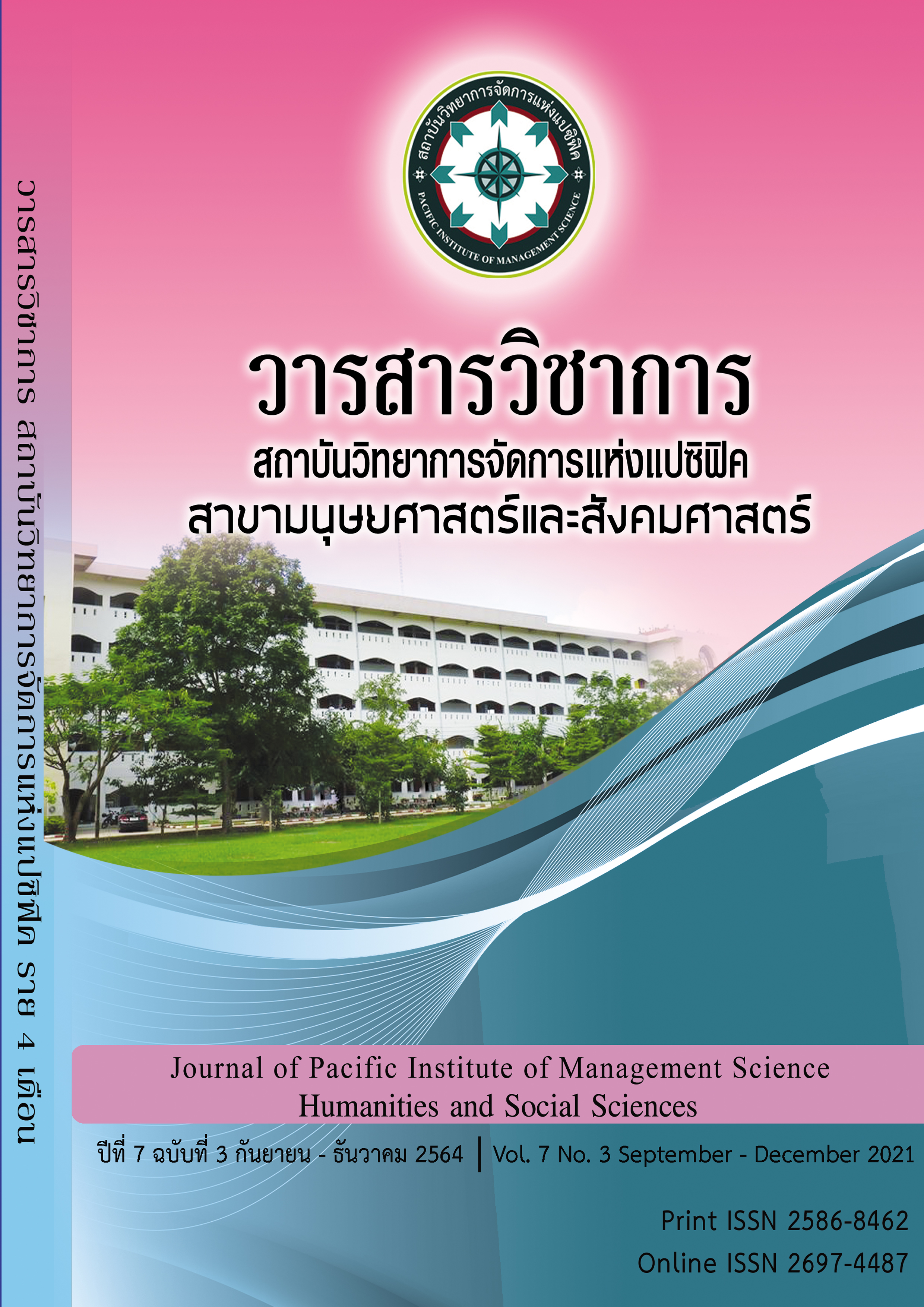The Strength Creation of Community in Samut Sakon Province on Buddhist Way for Environment Management
Keywords:
Strength creation of community, Buddhist way, Environmental managementAbstract
The objectives of this research were as follows: (1) to study the strength of environmental community in Samut Sakhon province, (2) to analyze the principles for strengthening the community for environmental management, and (3) to create and develop model of the Strength creation of community in Samut Sakon province on Buddhist way for environment management. Research was mixed methods both quantitative and qualitative. The sample group was the 400 people in Samut Sakhon province, including in-depth interviews with key informants 9 people and participants in 6 focus group discussions. The tools were questionnaires and structured in-depth interviews. The statistics used were frequency, percentage, mean, standard deviation, and t-test. Qualitative analysis uses content analysis by reading comprehension and summarizing it to answer research questions and research objectives.
The results of research were found that (1) the strength of the environmental community in Samut Sakhon were environmental Problems and environmental management had on high level in 2 aspects. (2) The principles for strengthening the community for environmental management as the Sikkha 3. The Sila 5 and the Loka-dhamma 8 for the revolution, Gharavasa-dhamma 4 and Agati 4 for the family, Sangahavatthu 4, Aparihaniyadhamma 7, Dasarajadhamma 10 for the Dedication. The strengthening of the community in Samut Sakhon Province according to the Buddhist way of managing the environment in all 3 aspects was at a high level. The creation and development model of the Strength creation of community in Samut Sakon province on Buddhist way for environment management were RFD MODEL = Revolution, Family, Dedication. The results of the assessment of the quality of the experts in the field of appropriateness and feasibility of application were at the highest level in every aspect. The results of the experiment showed that after training activities, people had more knowledge and understanding than before training. The knowledge gained is beneficial to the Buddhist way of life to strengthen the community. It can be used as a guideline for environmental management.
References
“ชุมชนเข้มแข็งทางเลือกใหม่ของการพัฒนา”, [ออนไลน์]. สืบค้นเมื่อ 2 มิถุนายน 2564. จาก http://std.kku.ac.th/4830801646/Website/page2.html.
ชูศรี วงศ์รัตนะ. (2541). เทคนิคการใช้สถิติเพื่อการวิจัย. พิมพ์ครั้งที่ 7. กรุงเทพมหานคร : เทพเนรมิต.
ธีระศักดิ์ อุ่นอารมณ์เลิศ. (2549). เครื่องมือวิจัยทางการศึกษา : การสร้างและการพัฒนา. นครปฐม : ภาควิชาพื้นฐานทางการศึกษา คณะศึกษาศาสตร์ มหาวิทยาลัยศิลปากร.
นภาภรณ์ หะวานนท์. (2543). วิธีวิทยาในการศึกษาปรากฏการณ์ความเข้มแข็งของชุมชน, ใน องค์ความรู้ในเรื่องความเข้มแข็งของชุมชน : จากปรากฏการณ์สู่ทฤษฎีรากหญ้า, เอกสารประกอบการสัมมนาทางวิชาการเรื่อง “องค์ความรู้ในเรื่องความเข้มแข็งของชุมชน : จากปรากฏการณ์สู่ทฤษฎีรากหญ้า” จัดโดยโครงการพัฒนาดัชนีความเข้มแข็งของชุมชน มหาวิทยาลัยศรีนครินทรวิโรฒ โดยการสนับสนุนของสำนักงานกองทุนสนับสนุนการวิจัย ณ ห้องสัมมนาสโมสรนายทหารโรงเรียนนายร้อยพระจุลจอมเกล้า จังหวัดนครนายก ระหว่างวันที่ 28-29 กุมภาพันธ์ 2543.
พระครูพิพิธจารุธรรม, ดร. (2558). “แนวทางการอนุรักษ์ป่าตามหลักคำสอนพุทธศาสนาเถรวาท : กรณีมูลนิธิฮักเมืองน่าน”, วารสารสันติศึกษาปริทรรศน์ มจร, ปีที่ 3 ฉบับที่ 2 กรกฎาคม-ธันวาคม 2558 : 30-31.
พระอธิการสุวิทย์ จกฺกธมฺโม (ปล้องไม้). (2556). “การศึกษาหลักพุทธธรรมในการแก้ไขปัญหาสิ่งแวดล้อม”, วิทยานิพนธ์พุทธศาสตรมหาบัณฑิต (สาขาวิชาพระพุทธศาสนา), บัณฑิตวิทยาลัย : มหาวิทยาลัยมหาจุฬาลงกรณราชวิทยาลัย.
วิทยา จันทร์แดง, “การพัฒนารูปแบบการบริหารจัดการชุมชนเข้มแข็งตามแนวปรัชญาเศรษฐกิจพอเพียง ในเขตจังหวัดภาคกลางตอนบน”, ดุษฎีนิพนธ์รัฐประศาสนศาสตรดุษฎีบัณฑิต, วิทยาลัยนวัตกรรมการจัดการ : มหาวิทยาลัยราชภัฏวไลยอลงกรณ์ ในพระบรมราชูปถัมภ์.
สมบูรณ์ ธรรมลังกา. (2556). “รูปแบบการเสริมสร้างความเข้มแข็งของชุมชนโดยใช้ภูมิปัญญาท้องถิ่นเป็นฐานในจังหวัดเชียงราย”, วารสารศึกษาศาสตร์ มหาวิทยาลัยนเรศวร, ปีที่ 15 ฉบับที่ 2 เมษายน – มิถุนายน 2556 : 58.
สุจินต์ ธรรมชาติ. (2549). การวิจัยภาคปฏิบัติวิธีลัด. กรุงเทพมหานคร : มหาวิทยาลัยมหามกุฏราชวิทยาลัย.
Taro Yamane. Statistics: An Introductory Analysis. 2nd ed. New York: Harper and Row, 1967.
[ออนไลน์]. สืบค้นเมื่อ 2 มิถุนายน 2564. จาก
http://www.sobkroo.com/detail_room_index.php?nid=2626.
[ออนไลน์]. สืบค้นเมื่อ 2 มิถุนายน 2564. จาก http://www.en.mahidol.ac.th/envischool/.
Downloads
Published
Issue
Section
License
Copyright (c) 2022 Pacific Institute of Management Science

This work is licensed under a Creative Commons Attribution-NonCommercial-NoDerivatives 4.0 International License.
บทความที่ได้รับการตีพิมพ์เป็นลิขสิทธิ์ของ สถาบันวิทยาการจัดการแห่งแปซิฟิค
ข้อความที่ปรากฏในบทความแต่ละเรื่องในวารสารวิชาการเล่มนี้เป็นความคิดเห็นส่วนตัวของผู้เขียนแต่ละท่านไม่เกี่ยวข้องกับสถาบันวิทยาการจัดการแห่งแปซิฟิค และคณาจารย์ท่านอื่นๆในสถาบันฯ แต่อย่างใด ความรับผิดชอบองค์ประกอบทั้งหมดของบทความแต่ละเรื่องเป็นของผู้เขียนแต่ละท่าน หากมีความผิดพลาดใดๆ ผู้เขียนแต่ละท่านจะรับผิดชอบบทความของตนเองแต่ผู้เดียว







